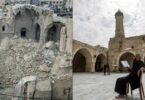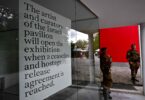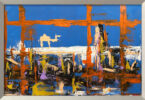Paul Schwennesen
Atowering plume of black smoke to the west, a gray smear across the eastern horizon, anonymous rumblings throughout the day—Kyiv is an embattled city. You wouldn’t know it, perhaps, by the strolling civilians out enjoying the early spring sunshine. Ignore the ubiquitous checkpoints—piles of concrete block, rusty iron hedgehogs, and armed sentries—and you might even forget this is a contested strategic stronghold.
And yet it is, and in more than merely the physical sense. This is where, it appears, the spirit of the Russian army has faltered. Tolstoy noted a similar moment at Borodinó, two centuries ago, when the “moral force” of Napoleon’s army was exhausted outside Moscow—a victory that “convinced the enemy of the moral superiority of his opponent and of his own impotence.”
Kyiv is now the capital of the world in this sense, and for this reason it is unlikely to fall. The attention of the world is focused here in part because of an innate sympathy for people fighting for their homes and their freedom. Ukrainians are tenaciously devoted to both, and it’s beginning to bear fruit on the battlefield. Bucha and Irpin, pillaged only last week, are on the brink of recapture. There is even talk that thousands, perhaps tens of thousands, of Russians can be captured—saving not only Ukrainian lives but the lives of abused and helpless Russian soldiers as well.
My brother in arms is a towering, shaved-headed North Carolinian. Not exactly a drawling archetype, though: he was born in Kyiv, as were his children. Ukraine is in his bones he tells me. He knows the enemy’s mind—he speaks perfect Russian and spent a decade in the Soviet Spetsnaz before renouncing his citizenship in favor a new life in America. We compare notes on Afghanistan: familiar names like Khost, Mezar, Herat, and Konduz.
“When were you there?” he asks.
“2005,” I reply. “And you?”
“1979 to 1981.”
Ah. I see…
He roars out greetings to the smorgasbord of special operators, security service, and police units that have taken over 15 floors of a venerable Soviet-era luxury escape. We hold the door for teams moving out—wooden ammunition boxes, packs bursting with gear, and Vietnam-era M14s.
We visit old friends of his. The husband is running late, he apologizes—he’s at the funeral of a friend killed by shrapnel three days ago. The wife is pale and shaken, apologizing profusely for the state of her flat: a collage of semi-evacuation, with mattresses on the floor, paintings wrapped in plastic, taped “X’s” across the window to reduce flying shards. Her nephew joined up yesterday and she’s babysitting his bulldog. The dog yaps—she jumps. Over plain spaghetti, fat sausages, and mustard, she explains, moist-eyed, how her sister in Moscow is coping. Neither of them can quite believe, even now, that this is happening to them. We’re all a little moist-eyed: smoke in the air or something.
Weird moments. Standing in line at the makeshift chow-hall, mute and alone on my side of the language barrier, watching otherwise-tough operators ask for frothed-milk cappuccinos. “Amerikano?” the impromptu barista winks at me—our silent joke. A black-robed Orthodox priest, sweaty under a heavy gold cross, is the only one allowed to cut the coffee line. A big hand reaches out to grab a handful of cookies off the counter. “I go…I go shoot Russians.” He’s not bluffing.
We discuss the corruption of absolute power while Piazzolla plays amidst the air raid sirens—our stilted Spanish chatter clarified by the unequivocal “Sic Semper Tyrannis.”
In Brovary, north of Kyiv: A cruise missile strike in the first moments of the war blew a 50-foot crater into this sleepy rural village, destroying the circle of homes around it. A limping mutt comes out to greet us, its back leg carefully bandaged. Three Holsteins bellow for feed, stuck inside a twisted fence alongside the crater.
Twenty-five innocent people were killed here, they say. A farmer shows me a piece of shrapnel the size of a matchbox. If the blast hadn’t knocked him out of bed, he tells me, it would have been twenty-six. He lives underground along with his potatoes and a scared terrier—the shelter is low, dank, and cramped. I ask how long he can live like that. “Until the end,” he says, almost cheerfully.
Our moral dander is up. No use trying to understand, let alone justify, why the free world is so righteously indignant over the rape of Ukraine—having mostly yawned at Georgia and Chechnya, to say nothing of the tragedies unfolding elsewhere. Such is life. War is fickle. An Argentine and a Columbian tell me this fight is about the freedom of Venezuela as much as it is about Ukraine. We discuss the corruption of absolute power while Piazzolla plays amidst the air raid sirens—our stilted Spanish chatter clarified by the unequivocal “Sic Semper Tyrannis.”
The spirit of the global community, like the spirit of an army, can crystallize in unexpected ways. This is a wellspring moment for Liberty, in the concrete sense. Informal networks of students who just months ago were content to put on colloquia about “free markets” and “rule of law” are now busily coordinating the Resistance, putting armor and vehicles and supplies to the front while confronting the very real prospect of picking up a weapon for the first time in their lives. Shy and kind-hearted women are driving enormous distances to help deliver communications gear to the military—their steely resolve tempered by a proudly traditional, unabashed nurturing instinct for “their men” on the front lines.
The ideals of individual autonomy, dignity, and freedom are so clear for a change—there is so little ambiguity in an artillery barrage, after all, that it makes it quite easy to live on righteous fury. Outside the surgery ward in a local hospital, we bring apples to a fellow fighter, felled six days ago by an enemy barrage. He is chipper, despite the pins and tubes sticking out of him—left leg broken and body lacerated. He is counting the days before he can get back to the front. He apologizes through a wired jaw for his broken English—he worked for Cisco as an “IT guy” before the war—who would have thought he would be here, he laughs.
The spirit of Putin’s army, like that of Napoleon’s, has broken upon the unshakeable shoals of the basic human impulse toward freedom. It is here that the essential impossibility of capitulating to raw, brute force has become manifest. God willing, the events over the last few days here will give strength and resolve to Belarusians, to Moldovans, to Crimeans, and to people everywhere who say “enough.” No more tyrannical demands, no more crushing of individual natural rights, no more destruction of peaceful lives. As we send Putin’s forces backwards on the “old Smolénsk road,” a trail littered with the memories of invading armies, it is to the refrain of the human spirit which quietly but firmly thrums: “Liberty, Liberty, Liberty.”
Here in Ukraine, the ideals of freedom have suddenly taken on a new, concrete reality for everyone.
Paul Schwennesen is completing a PhD dissertation on environmental history and Spanish conquest in the Arizona/New Mexico borderlands. He holds a Master’s degree in Government from Harvard University and degrees in History and Science from the United States Air Force Academy. He is a regular contributor to the Property and Environment Research Center and his writing has appeared at The New York Times, American Spectator, Claremont Review, and in textbooks on environmental ethics (Oxford University Press and McGraw-Hill). He is the father, most importantly, of three delightful children.
Courtesy: (Lawliberty)






